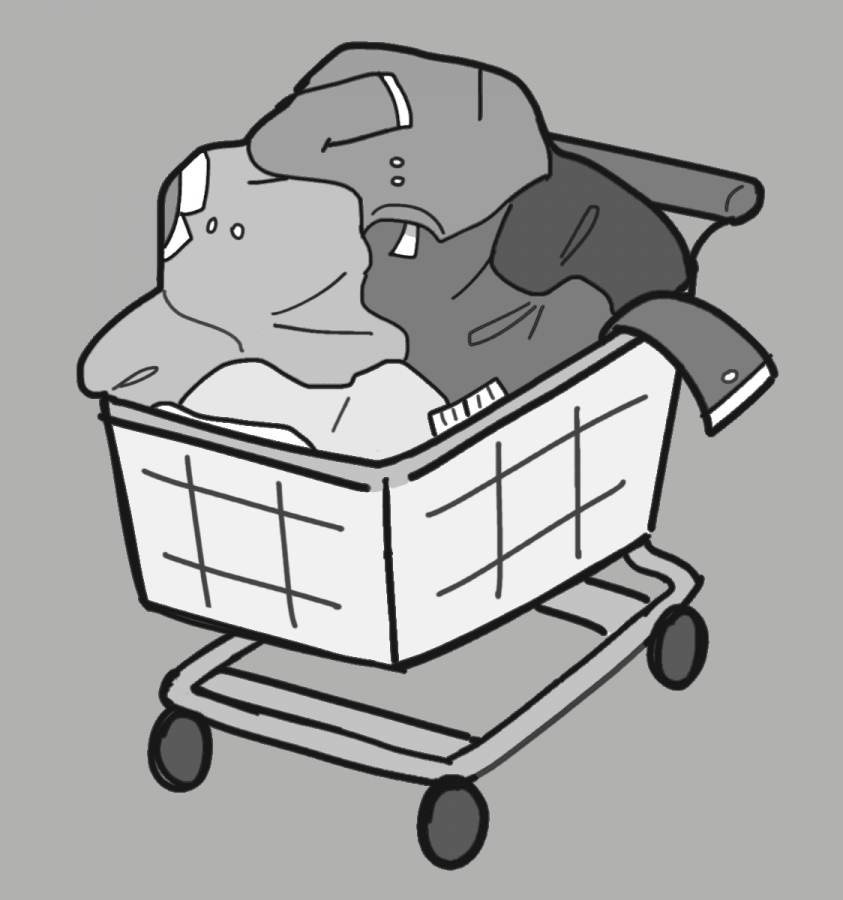A&E: Students consider the benefits and drawbacks of buying and reselling thrifted clothes on Depop
Students’ opinions differ in regards to buying thrifted clothing in bulk.
Through the rise of thrifting and second-hand fashion, reselling apps have grown in popularity. While some people believe thrifting is intended solely for lower-income households, others view thrifting and reselling as a way to recycle clothing and give an item a new life.
Junior Noura Sajedi sells clothing on Depop. According to Sajedi, she enjoys having the ability to buy and sell clothing and accessories that other people cannot easily get anywhere else.
“Depop has a lot of vintage and unique items that you can’t find in regular stores,” Sajedi said. “It also offers lots of custom items made by smaller businesses, which is super cute.”
Sajedi also supports resellers who thrift and resell what they have purchased. She is aware that much of the clothing in thrift stores ends up in landfills, and believes that when people buy thrifted clothes and resell them, they can reach a wider range of consumers.
“Reselling thrifted clothing is a great way to sell clothes to people who do not have access to thrift stores,” Sajedi said. “Our planet is being destroyed due to clothes in landfills. We can prevent this from happening by reselling.”
According to Sajedi, Depop offers a wide range of styles and clothing that suit her. She feels that anyone can find something they like on the app.
“I think the thrift store has super cute clothes. Whenever I go to the mall, I can’t find anything in my style,” Sajedi said. “At a thrift store or Depop, I can easily find something cute and unique that no one else has.”
Similarly, senior Antonio Rico believes that thrifting and reselling are great ways to prevent clothing from going to waste.
“Thrift shopping and reselling clothing is very eco-friendly, and we should be doing more of it instead of trashing our clothing,” Rico said.
Alternatively, freshman Glaiza Mae Buenaflor is against selling thrifted items. She believes thrift stores are intended for lower-income families and that buying thrifted items when one does not need to is harmful.
“People who don’t have much depend on thrift stores. Therefore, people who are able to afford clothing for regular prices should just stick to those stores,” Buenaflor said. “When they buy (thrifted) clothing, they don’t seem to know that they really are taking clothing from less fortunate people.”
Buenaflor is also wary of the tendency among some resellers to buy specific high-demand items needed most by lower-income individuals.
“Winter is a cold, windy and rainy season. People tend to go there (thrift stores) and accidentally take jackets for ‘fashion’ then end up leaving none for those who need it most,” Buenaflor said. “And when they resell, they’re trying to make profit of course, but they should start thinking about others who don’t have much.”
Rico feels that reselling thrifted items is not necessarily taking from others. However, he still thinks people should be conscious of what they purchase from thrift stores.
“Many thrift stores have a steady supply of clothing every day from people who donate their clothing,” Rico said. “That’s why instead of breaking the cycle, people should try and be more generous towards others and consider what others need.”
Freshman Tomie Ishimatsu, also a seller on Depop, considers both sides. Like Buenflor, she believes reselling apps become problematic when wealthy sellers target thrift stores in lower-income areas when purchasing their inventory.
“They are almost taking items away that people actually need, like in the winter, heavier coats.” Ishimatsu said. “But again, even in lower-income areas, thrift stores still throw away stuff, but resellers just need to be careful (when) buying items.”
Ishimatsu also finds it controversial when people resell items for unreasonable prices.
“Depop really started so people who couldn’t thrift could still buy things secondhand,” Ishimatsu said. “There are sellers who people are mad at because they were selling trendy tee-shirts they thrifted for over $40, and I just don’t think that’s okay.”
On the other hand, Ishimatsu appreciates how buying and selling on Depop is another way to avoid clothing and textile waste.
“Just being able to shop and sell second hand and make sure clothing doesn’t go into landfills is really great. Also, it’s an alternative to supporting fast fashion,” Ishimatsu said. “I just think that resellers shouldn’t be buying so much clothing in bulk to resell it and rather be more selective and self-aware.”


